|
|
|
Sort Order |
|
|
|
Items / Page
|
|
|
|
|
|
|
| Srl | Item |
| 1 |
ID:
095540
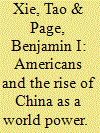

|
|
|
|
|
| Publication |
2010.
|
| Summary/Abstract |
The rapid ascendency of China has attracted considerable attention from American scholars, policymakers, and media. Yet what does the American public think about the rise of China as a world power? In this paper we use survey data collected by the Chicago Council on Global Affairs and other organizations to explore the nature and causes of Americans' views. It turns out that most Americans are well aware of the rise of China. Some are apprehensive about that rise, chiefly for national security (rather than economic) reasons, and many favor a degree of off-shore 'balancing' of the sort that realists recommend. But few Americans want to actively work to limit the rise of China. Very few favor the use of troops to defend Taiwan. Very few favor a nuclear-armed Japan. Large majorities of Americans take stands more akin to those of neo-liberals than realist theorists, favoring cooperation and peaceful engagement with China.
|
|
|
|
|
|
|
|
|
|
|
|
|
|
|
|
| 2 |
ID:
171365
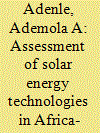

|
|
|
|
|
| Summary/Abstract |
Renewable energy sources like solar energy have an important role to play towards the implementation of the 2030 agenda and Sustainable Development Goals (SDGs) in Africa. While renewable energy was not stated as one of the technologies for the achievement of the Millennium Development Goals (MDGs), it played an indirect role towards meeting MDG targets especially in the areas such as household application, health, education and poverty reduction in Africa. However, renewable energy's impacts (including solar energy technologies) were not quantified, and lack of performance assessment could be in part attributed to the weak implementation of solar energy projects in the developing world including countries in Africa. The aim of this paper is to conduct meta-analysis of the literature on the performance of solar energy technologies in order to determine solar energy adoption trends in African countries. This is supplemented with expert interviews and data gathered from the World Bank/Global Environment Facility. Using three case studies of Ghana, Kenya and South Africa, this paper examines the benefits and challenges that are associated with the application of solar energy technologies for meeting SDGs in Africa. Finally, the paper concludes by highlighting the policy implication for the application of solar energy technologies.
|
|
|
|
|
|
|
|
|
|
|
|
|
|
|
|
| 3 |
ID:
175215
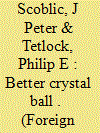

|
|
|
|
|
| Summary/Abstract |
E
verypolicy is a prediction.Tax
cuts will boost the economy.
Sanctions will slow Iran’s nuclearprogram.Travelbans will limit
the spread of COVID-19.These claims all
posit a causal relationship between
means and ends. Regardless of party,
ideology, or motive, no policymaker
wants his or her recommended course of
action to produce unanticipated consequences. This makes every policymaker
aforecaster. But forecasting is dicult,
particularly when it comes to geopolitics—a domain in which the rules of
thegame are poorly understood, information is invariably incomplete, and
expertise often confers surprisingly little
advantage in predicting future events.
These challenges present practical
problems for decision-makers in the
U.S.government.
|
|
|
|
|
|
|
|
|
|
|
|
|
|
|
|
| 4 |
ID:
105380
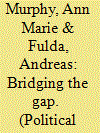

|
|
|
|
|
| Publication |
2011.
|
| Summary/Abstract |
In his seminal work Bridging the Gap: Theory and Practice in Foreign Policy, Alexander George (1993) lamented the great divide between academia and the foreign policymaking community, arguing that greater interaction between scholars and policymakers would produce better policy. We share George's belief that scholars and practitioners each have much to offer the other. In fact, a wide spectrum of opportunities exists for scholars in the field of political science to engage in meaningful public service that can enhance every aspect of their careers, as well as contribute to international understanding.
|
|
|
|
|
|
|
|
|
|
|
|
|
|
|
|
| 5 |
ID:
093911
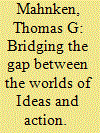

|
|
|
| 6 |
ID:
108842
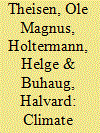

|
|
|
|
|
| Publication |
2011-12.
|
| Summary/Abstract |
Dominant climate models suggest that large parts of Africa will experience greater climatic variability and increasing rates of drought in coming decades. This could have severe societal consequences, because the economies and food supplies of most African countries depend on rain-fed agriculture. According to leading environmental security scholars, policymakers, and nongovernmental organizations, an increase in scarcity-driven armed conflicts should also be expected. A conditional theory of environmental conflict predicts that drought increases the risk of civil war primarily when it strikes vulnerable and politically marginalized populations in agrarian societies. However, an empirical evaluation of this general proposition through a unique gridded dataset of postcolonial Africa, which combines high-resolution meteorological data with georeferenced data on civil war onset and the local ethnopolitical context, shows little evidence of a drought-conflict connection. Instead, the local risk of civil war can be explained by sociopolitical and geographic factors: a politically marginalized population, high infant mortality, proximity to international borders, and high local population density.
|
|
|
|
|
|
|
|
|
|
|
|
|
|
|
|
| 7 |
ID:
153908
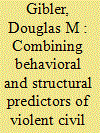

|
|
|
|
|
| Summary/Abstract |
Large-N studies of civil war overwhelmingly consider the state-specific structural conditions that make conflict likely. Meanwhile, policymakers often ignore these factors and instead search for patterns among the behavioral triggers of violence. This article combines these approaches. I use conflict narratives from the International Crisis Group’s CrisisWatch publications to cross-validate structural analyses of civil conflict and confirm the mechanisms that lead to outbreaks of violence in conflict-prone countries. I then correct for selection bias in the narrative data with an underlying model of conflict likelihood. I find that several indicators thought to be causally related to civil conflict do indeed continue to have an effect after selection. However, the narrative data overemphasizes both the importance of several low-intensity, separatist conflicts within developed democracies and the potential for conflict among oil-rich states. These analyses highlight the importance of combining structural, large-N analyses with qualitative assessments of conflict zones. My findings also provide support for a state-capacity explanation of conflict behavior.
|
|
|
|
|
|
|
|
|
|
|
|
|
|
|
|
| 8 |
ID:
132424
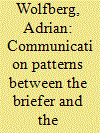

|
|
|
|
|
| Publication |
2014.
|
| Summary/Abstract |
Intelligence professionals called "briefers" provide intelligence information on a daily basis to senior civilian policymakers. Herein is a description of what actually takes place prior to, during, and after the face-to-face interaction. While a body of work exists on presidential briefings, this assessment is unique because it deals with the process of transferring knowledge to policymakers, and specifically from the briefer's perspective. Individuals from the outside, and even intelligence officers or others who have studied intelligence but have not been "briefers," might find some of this material fascinating, yet possibly hard to believe. But those who have been "briefers" will find that this mostly validates their experience."
|
|
|
|
|
|
|
|
|
|
|
|
|
|
|
|
| 9 |
ID:
104335
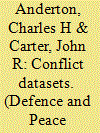

|
|
|
|
|
| Publication |
2011.
|
| Summary/Abstract |
Prominent conflict datasets used in the social scientific study of war and peace are summarized. These include datasets for armed conflicts (e.g., COW and UCDP/PRIO wars and sub-war conflicts), terrorism (e.g., GTD and ITERATE terrorist incidents), and events (e.g., WEIS, KEDS, and VRA cooperative and conflict actions). Topics explored include the diversity of conflict types, alternative definitions of war and sub-war conflict, historical patterns of violence in the international system, and degree of overlap across datasets.
|
|
|
|
|
|
|
|
|
|
|
|
|
|
|
|
| 10 |
ID:
090139
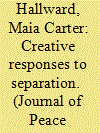

|
|
|
|
|
| Publication |
2009.
|
| Summary/Abstract |
This article examines creative ways in which Israeli and Palestinian activists engage with each other and the powers seeking to separate them in their nonviolent struggles for a just and lasting peace. Using the geopolitical theory of territoriality, the article briefly examines a number of administrative, physical, and psychological barriers facing joint activism and the strategies activists use to counteract them. Drawing on nonviolent theory and practice, the article analyzes how activists exert power through the creative use of symbols and practices that undermine the legitimacy of occupation policies. Based on fieldwork conducted in 2004-05 and July 2006, the article explores the implications of this activism on conceptions of identity, and strategies for restarting a moribund peace process. The relative `success' of sustained joint action in Bil'in can provide scholars and policymakers with innovative approaches for addressing some of the outstanding issues needing to be addressed by official negotiators. Although government bodies are more constrained than activists, the imaginative means of engaging with the system - and the reframing of issues through the redeployment of `commonplaces' - can perhaps provide inspiration, if not leverage, for thinking outside of the box.
|
|
|
|
|
|
|
|
|
|
|
|
|
|
|
|
| 11 |
ID:
072121
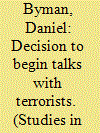

|
|
|
|
|
| Publication |
2006.
|
| Summary/Abstract |
Governments have many means to begin a dialogue with terrorist groups. The offer of talks may lead terrorists' constituents to reduce their support for violence, and moderates within a group itself may also turn away from violence. Despite these potential benefits, even the consideration of entering discussions carries many risks. Talks with U.S. officials do indeed reward the use of terrorism, tangibly demonstrating that groups can kill innocents and yet become legitimate interlocutors-a reward that is costly both in terms of reducing the prevalence of this tactic worldwide and because it inevitably angers local allies fighting the groups. Moreover, talks often fail in a variety of ways, giving the terrorists a breathing space to rearm and organize and leaving the government looking foolish. Because talks often fail, policymakers should carefully explore whether the conditions are right for any hope of success before they begin a dialogue.
|
|
|
|
|
|
|
|
|
|
|
|
|
|
|
|
| 12 |
ID:
109574
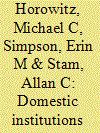

|
|
|
|
|
| Publication |
2011.
|
| Summary/Abstract |
Military leaders, policymakers, and academics have long debated the relative merits of volunteer versus conscript armies. They also have studied the possible effects of eroding resolve among mass publics in democratic states during wartime. In this paper, we use battlefield casualty data from the population of interstate wars to compare theories of property takings and domestic institutions. We find conscription, like other non-market-based property takings, to be a wasteful means of mobilizing military manpower. Volunteer armies suffer far fewer casualties than their conscripted counterparts. We also find that this effect compounds when interacted with regime type. Volunteer democratic armies suffer especially few casualties. Finally, we find that democratic societies are willing to bear the costs of large-scale commitments to maintaining state sovereignty and survival when targeted by authoritarian states, at times in the face of certain defeat.
|
|
|
|
|
|
|
|
|
|
|
|
|
|
|
|
| 13 |
ID:
093289
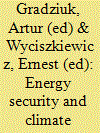

|
|
|
|
|
| Publication |
Warsaw, Polish Institute of International Affairs, 2009.
|
| Description |
172p.
|
| Standard Number |
9788389607799
|
|
|
|
|
|
|
|
|
|
|
|
Copies: C:1/I:0,R:0,Q:0
Circulation
| Accession# | Call# | Current Location | Status | Policy | Location |
| 054625 | 338.79/GRA 054625 | Main | On Shelf | General | |
|
|
|
|
| 14 |
ID:
090948
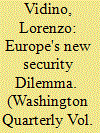

|
|
|
|
|
| Publication |
2009.
|
| Summary/Abstract |
After the September 11, 2001, attacks, governments throughout the world rushed to improve their counterterrorism policies. Several countries tightened legislation, increased resources available to their intelligence and law enforcement agencies, and established repressive policies to uncover and prosecute terrorist networks. Policymakers, fearing an imminent attack, understandably focused their attention on aggressive methods. Yet, over the last few years, many governments have started thinking about more nuanced, comprehensive, and long-term counterterrorism policies, understanding that simply trying to dismantle terrorist networks is like playing a never-ending game of "whack-a-mole," unless steps are also taken to prevent the radicalization of scores of potential new militants.
|
|
|
|
|
|
|
|
|
|
|
|
|
|
|
|
| 15 |
ID:
091459
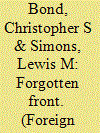

|
|
|
|
|
| Publication |
2009.
|
| Summary/Abstract |
U.S. policymakers can no longer afford to ignore Southeast Asia. The United States should use trade, aid, and education to alleviate poverty and prevent terrorism in the region.
|
|
|
|
|
|
|
|
|
|
|
|
|
|
|
|
| 16 |
ID:
100792
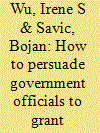

|
|
|
|
|
| Publication |
2010.
|
| Summary/Abstract |
Rick Farmer's article focuses on ways in which academic political scientists can influence policymakers. At the Toronto meeting of the Working Group on Practicing Politics, government political scientists also recognized that academics often are frustrated by the process of getting information from the government and cooperation from officials.
|
|
|
|
|
|
|
|
|
|
|
|
|
|
|
|
| 17 |
ID:
152918
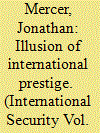

|
|
|
|
|
| Summary/Abstract |
Policymakers and international relations scholars concur that prestige is critical to world politics because states having prestige enjoy greater authority. An examination of how policymakers assess their and other states' prestige, however, reveals that this traditional view of prestige is wrong, for two reasons. First, policymakers do not analyze their own states' prestige, because they feel they already know it. They use their feelings of pride and shame as evidence of their state's prestige. Second, political and psychological incentives encourage policymakers to explain another state's behavior in ways that make it unlikely that states gain prestige. Policymakers systematically discount the prestige of other states; a belief that their state has earned the respect and admiration of others is therefore illusory. Consequently, the justification for costly prestige policies collapses. In other words, states should not chase what they cannot catch. Evidence from the South African War supports this conclusion.
|
|
|
|
|
|
|
|
|
|
|
|
|
|
|
|
| 18 |
ID:
110163
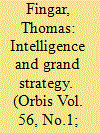

|
|
|
|
|
| Publication |
2012.
|
| Summary/Abstract |
Elegant strategies can be constructed without reference to intelligence but persuading policymakers to implement them without knowing what intelligence might have to say about their likely efficacy and unintended consequences would be exceedingly difficult. Intelligence-derived information and insights should not dictate the goals of grand strategy, but they should inform decisions about what to do, how to do it, and what to look for in order to assess how well or badly the strategy is working.
The relationship between intelligence and grand strategy is similar to the relationship of intelligence to policymaking. Grand strategists, like policymakers, can-and often do-formulate plans and develop policies without seeking or heeding information and insights from intelligence analysts.1 History is replete with examples of smart people who developed compelling theories of international relations and/or effective strategies to protect and pursue the interests of their countries without reliance on inputs from spies, satellites, analysts, or other accoutrements of intelligence.
|
|
|
|
|
|
|
|
|
|
|
|
|
|
|
|
| 19 |
ID:
092224
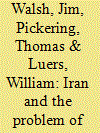

|
|
|
|
|
| Publication |
2009.
|
| Summary/Abstract |
It seems that every conversation about Iran is a conversation about sanctions. Even in the midst of negotiations, the talk is as likely to be about the sanctions that might follow as it is about the negotiation itself. This is an odd and unfortunate state of affairs.
|
|
|
|
|
|
|
|
|
|
|
|
|
|
|
|
| 20 |
ID:
118368
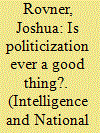

|
|
|
|
|
| Publication |
2013.
|
| Summary/Abstract |
Politicization is the manipulation of intelligence estimates to reflect policy preferences. Policymakers are guilty of politicization if they compel intelligence agencies to alter their conclusions in ways that are politically convenient or psychologically comforting. Intelligence officials are guilty of politicization if they shape their estimates to reflect their own beliefs and preferences. At first glance politicization appears to be an unalloyed hazard: manipulating estimates seems to make bad intelligence inevitable. Nonetheless, some observers argue that under certain circumstances politicization can be a good thing, or at least a necessary risk. Intelligence officials should be willing to take that risk if the alternative means isolating themselves from the policy process and sacrificing any possible influence over policymakers' judgment. They also should be willing to tone down their conclusions on major issues, or withhold estimates on minor ones, in order to avoid offending policymakers. This kind of 'soft politicization' does not mean outright pandering, but it does constrain intelligence leaders from being blunt about estimates that are frankly at odds with policy beliefs and preferences. This article evaluates the possible benefits of politicization and tests it against the historical record. I conclude that politicization - even soft politicization - undermines the quality of threat assessment and does lasting damage to intelligence-policy relations.
|
|
|
|
|
|
|
|
|
|
|
|
|
|
|
|
|
|
|
|
|